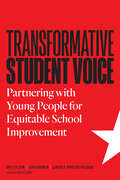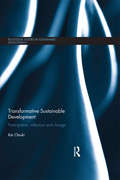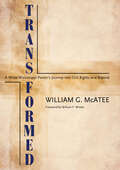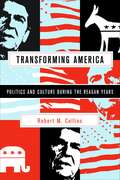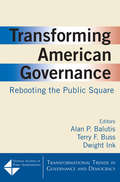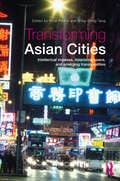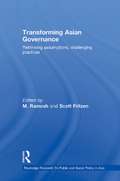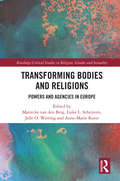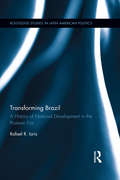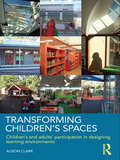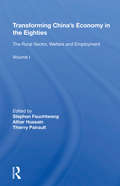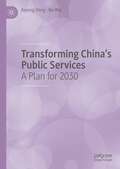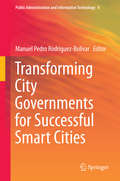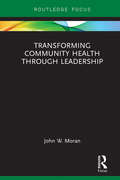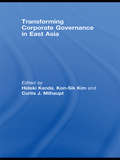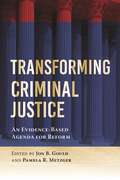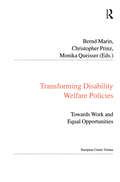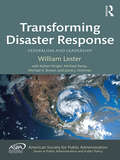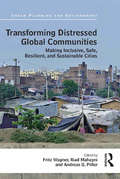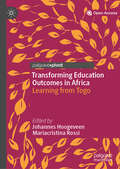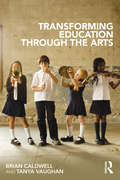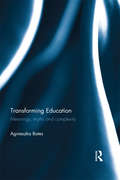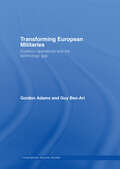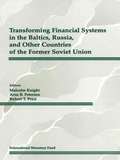- Table View
- List View
Transformative Student Voice: Partnering with Young People for Equitable School Improvement
by Ben Kirshner Shelley Zion Carlos P Hipolito-DelgadoA testament to the power of centering youth voices in planning and implementing school reform
Transformative Sustainable Development: Participation, reflection and change (Routledge Studies in Sustainable Development)
by Kei OtsukiRecent debates about sustainable development have shifted their focus from fixing environmental problems in a technocratic and economic way to more fundamental changes in social-political processes and relations. In this context, participation is a genuinely transformative approach to sustainable development, yet the process by which participation leads to transformation is not sufficiently understood. This book considers how the act of participating in sustainable development projects can bring about social transformation that is considered to be fair and just by the participants and non-participants in a broader societal context. Drawing on ideas from social theory and applied anthropology, the book proposes a reflexivity-based framework to analyse participation as a type of social action underpinned by primary experience. Development projects have a transformative effect when participants are given the opportunity to reflect on their experience, share the reflection with others, and open new space for collective deliberation and change. The book applies this framework to assess community-based participatory projects in the Amazon, African slums and rural settlements, and disaster stricken areas in Japan. It also outlines potential institutions of governance to institutionalize the change by referring to current food governance, drawing out lessons with international relevance. This book will be of interest to students of sustainable development, environmental policy and development studies, as well as practitioners and policy-makers in these fields.
Transformed: A White Mississippi Pastor’s Journey into Civil Rights and Beyond (Willie Morris Books in Memoir and Biography)
by William G. McateeIn May 1964, Bill McAtee became the new minister at Columbia Presbyterian Church, deep in the Piney Woods of south Mississippi. Soon after his arrival, three young civil rights workers were brutally murdered outside Philadelphia, Mississippi. Many other activists from across the country poured into the state to try to bring an end to segregation and to register Black citizens to vote. Already deeply troubled by the resistance of so many of his fellow white southerners to any change in the racial status quo, McAtee understood that he could no longer be a passive bystander. A fourth-generation Mississippian and son of a Presbyterian minister, he joined a group of local ministers—two white and four Black—to assist the mayor of Columbia, Earl D. “Buddy” McLean, in building community bridges and navigating the roiling social and political waters. Focusing on the quiet leadership of Mayor McLean and fellow ministers, McAtee shows how these religious and political leaders enacted changes that began opening access to public institutions and facilities for all citizens, Black and white. In retrospect, McAtee’s involvement in these events during this intense period became a turning point in repudiating his past acquiescence to the injustices of the racist society of his birth. His personal account of this transformation underscores its meaning for him today and reminds the reader that no generation can ignore the past or rest comfortably on its progress toward tolerance, equality, and justice.
Transforming America: Politics and Culture During the Reagan Years
by Robert M. CollinsBy the end of the 1980s, the "malaise" that had once pervaded American society was replaced by a renewed sense of confidence and national purpose. However, beneath this veneer of optimism was a nation confronting the effects of massive federal deficits, a reckless foreign policy, AIDS, homelessness, and a growing "cultural war." In Transforming America, renowned historian Robert Collins examines the decade's critical and controversial developments and the unmistakable influence of Ronald Reagan. Moving beyond conventional depictions that either demonize or sanctify Reagan, Collins offers fresh insights into his thought and influence. He portrays Reagan as a complex political figure who combined ideological conservatism with political pragmatism to achieve many of his policy aims. Collins demonstrates how Reagan's policies helped to limit the scope of government, control inflation, reduce the threat of nuclear war, and defeat communism. Collins also shows how the simultaneous ascendancy of the right in politics and the left in culture created a divisive legacy. The 1980s witnessed other changes, including the advent of the personal computer, a revolution in information technology, a more globalized national economy, and a restructuring of the American corporation. In the realm of culture, the creation of MTV, the popularity of self-help gurus, and the rise of postmodernism in American universities were the realization of the cultural shifts of the postwar era. These developments, Collins suggests, created a conflict in American society that continues today, pitting cultural conservatism against a secular and multicultural view of the world.Entertaining and erudite, Transforming America explores the events, movements, and ideas that defined a turbulent decade and profoundly changed the shape and direction of American culture and politics.
Transforming American Governance: Rebooting the Public Square (Transformational Trends In Governance And Democracy Ser.)
by Alan P. Balutis Dwight InkGovernment and governance will be very different in the future than anticipated by the literature in the field.
Transforming Asian Cities: Intellectual impasse, Asianizing space, and emerging translocalities
by Nihal Perera Wing-Shing TangWhile there is no lack of studies on Asian cities, the majority focus on financial districts, poverty, the slum, tradition, tourism, and pollution, and use the modern, affluent, and transforming Western city as the reference point. This vast Asian empirical presence is not complemented by a theoretical presence; academic discourses overlook common and basic urban processes, particularly the production of space, place, and identity by ordinary citizens. Switching the vantage point to Asian cities and citizens, Transforming Asian Cities draws attention to how Asians produce their contemporary urban practices, identities, and spaces as part of resisting, responding to, and avoiding larger global and national processes. Instead of viewing Asian cities in opposition to the Western city and using it as the norm, this book instead opts to provincialize mainstream and traditional knowledge. It argues that the vast terrain of ordinary actors and spaces which are currently left out should be reflected in academic debates and policy decisions, and the local thinking processes that constitute these spaces need to be acknowledged, enabled, and critiqued. The individual chapters illustrate that "global" spaces are more (trans)local, traditional environments are more modern, and Asian spaces are better defined than acknowledged. The aim is to develop room for understandings of Asian cities from Asian standpoints, especially acknowledging how Asians observe, interpret, understand, and create space in their cities.
Transforming Asian Governance: Rethinking assumptions, challenging practices (Routledge Research On Public and Social Policy in Asia)
by M. Ramesh Scott FritzenThere are a multitude of hazards that confront attempts to change institutional or political orders in pursuit of good governance. Even seemingly technical prescriptions run up against local political and social realities which make their adoption difficult and, if adopted, require significant modification of the original prescriptions. Moreover, the technical, rationalist and/or normative language employed in the good governance discourse masks contests over power, rights, resources, and actors’ conflicting interests. There is a definite need to situate the good governance debate in the local context rather than reflexively adopting a universalistic positing of the fact or desirability of governance convergence across countries and sectors because the reality is that the world-wide deployment of good governance rhetoric is not accompanied by convergence in thinking or practices across nations. Transforming Asian Governance asks: • How do good governance principles translate into local settings?• How do local settings influence the conception of what is good governance and how the debate over good governance is deployed as a political or administrative strategy? Using case studies in governance from Thailand, the Philippines, Pakistan, Malaysia, India, Indonesia, Korea and Japan, this book will be essential reading for anyone interested in the public and social policy of Asia, and international and comparative governance more generally.
Transforming Bodies and Religions: Powers and Agencies in Europe (Routledge Critical Studies in Religion, Gender and Sexuality)
by Mariecke Van Den Berg Lieke Schrijvers Jelle Wiering Anne-Marie KorteThis book sheds an interdisciplinary light on ‘transforming bodies’: bodies that have been subjected to, contributed to, or have resisted social transformations within religious or secular contexts in contemporary Europe. It explores the intersections of race, ethnicity, gender, sexuality and religion that underpin embodied transformations. Using post-secularist, postcolonial and gender/queer perspectives, it aims to gain a better understanding of the orchestrations and effects of larger social transitions related to religion. This volume is the outcome of the intensive collaboration of the authors, who for years have been meeting regularly in Utrecht, the Netherlands, to discuss themes related to religion and ‘the challenge of difference’, with an added afterword by Prof. Pamela Klassen from the University of Toronto. The book is divided in three subsections that focus on particular types of embodiment: body politics in governmental and NGO organisations; the role of the body in literary and/or autobiographical narratives; and ethnographic case studies of bodies in daily life. Doing so, it provides an innovative exploration of contemporary religion and the body. It will, therefore, be of great interest to scholars of Religious Studies, Gender and Sexuality Studies, Post-Colonial Studies, Anthropology, Sociology, Theology, and Philosophy.
Transforming Brazil: A History of National Development in the Postwar Era (Routledge Studies in Latin American Politics)
by Rafael R. IorisIn this book, Rafael R. Ioris critically revisits the postwar context in Brazil to reexamine traditional questions and notions pertaining to the nature of Latin America’s political culture and institutions. It was in this period that the region lived some of its most intense and successful experiences of fast economic growth, which was paradoxically marred by heightened ideological divisions, political disruptions, and the emergence of widespread authoritarian rule. Combining original sources of political, diplomatic, intellectual, cultural, and labor histories, Ioris provides a comprehensive history of the fruitful debates concerning national development in postwar Brazil, a time when the so-called country of the future faced one of its best moments for consolidating political democracy and economic prosperity. He argues that traditional views on political instability have been excessively grounded on an institutional focus, which should be replaced by in-depth analysis of events on the ground. In so doing, he reveals that as national development meant very different things to multiple different social segments of the Brazilian society, no unified support could have been provided to the democratically elected political regime when things rapidly became socially and politically divisive early in the 1960s. Innovating in its multidimensional analytical scope and interdisciplinary focus, Transforming Brazil provides a rich political, cultural, and intellectual examination of a historical period characterized by rapid socio-economic changes amidst significant political instability and the heightened ideological polarization shaping the political scenario of Brazil and much of Latin America in the Cold War era.
Transforming Children's Spaces: Children's and Adults' Participation in Designing Learning Environments
by Alison ClarkHow can young children play an active role in developing the design of learning environments? What methods can be used to bring together children’s and practitioners’ views about their environment? What insights can young children offer into good designs for these children’s spaces? With the expansion of early childhood education and the move to 'extended schools', more young children will spend more time than ever before in institutions. Based on two actual building projects, this book is the first of its kind to demonstrate the possibilities of including young children’s perspectives in the design and review of children’s spaces. Situated at the heart of the debate about the relationship between the built environment and its impact on children’s learning and wellbeing, Transforming Children’s Spaces provides insights into how young children see their environment discusses children’s aspirations for future spaces develops the 'Mosaic approach' , pioneered by the author, as a method for listening to young children and adults Emphasising the importance of visual and verbal methods of communication, this fascinating book demonstrates how practitioners and young children can articulate their perspectives, and shows how participatory methods can support new relationships between children, practitioners and architects. This book is essential reading for those who work in children's spaces and for those who design them as well as being of general interest to those studying education and childhood studies.
Transforming China's Economy In The Eighties: Vol. 1: The Rural Sector, Welfare And Employment
by Stephen FeuchtwangThis is the first of two volumes on the transformation of China since 1978. The second volume concentrates on the government administration of the reforms which have brought changes in economic organization; it deals with the urban economy. The focus of this volume is on changes in the rural economy, provision for basic needs such as nutrition and
Transforming China's Public Services: A Plan for 2030
by Keyong Dong Na WeiThis book explores the developmental direction of the modernization of China's basic public services in the context of national governance modernization. Describing the blueprint for the modernization of China's basic public services in 2030, including basic public education, basic medical and health services, basic old-age services, and basic public cultural services, this book reflects Chinese public management scholars' strategies for the modernization of China’s public services in the next 10 years and the path to get there. This book will interest scholars of Chinese governance, as well as readers who want to understand the current status, challenges and development strategies of China's public service and social policy fields.
Transforming City Governments for Successful Smart Cities
by Manuel Pedro Rodríguez-BolívarThere has been much attention paid to the idea of Smart Cities as researchers have sought to define and characterize the main aspects of the concept, including the role of creative industries in urban growth, the importance of social capital in urban development, and the role of urban sustainability. This book develops a critical view of the Smart City concept, the incentives and role of governments in promoting the development of Smart Cities and the analysis of experiences of e-government projects addressed to enhance Smart Cities. This book further analyzes the perceptions of stakeholders, such as public managers or politicians, regarding the incentives and role of governments in Smart Cities and the critical analysis of e-government projects to promote Smart Cities' development, making the book valuable to academics, researchers, policy-makers, public managers, international organizations and technical experts in understanding the role of government to enhance Smart Cities' projects.
Transforming Community Health through Leadership
by John W. MoranAs the United States faces increasingly difficult and trenchant public health problems, from the Zika virus to the obesity epidemic to the opioid crisis, population health is a growing area of concern for public health organizations, particularly how to care for populations effectively on a shoestring budget. Though little discussed in the mainstream media, community health improvement organizations are increasingly partnering and forming coalitions with local hospitals, working together to improve traditional medical care. But with the pace of change in health care policy, these coalitions must be thoughtfully lead and managed. This new book from John W. Moran, Senior Quality Advisor to the Public Health Foundation, demonstrates how to build, operate, manage, and sustain a community health improvement coalition once it is formed. Offering the reader practical examples and guidance on forming and sustaining a community health coalition, this book demonstrates the ways in which the success of a coalition depends upon a stable anchor organization and a committed leader. Chapters focus on each of these roles and how to achieve success in each: examining what needs improvement, why it is important to improve now, how it will be done, and where in the community improvement can have the most impact. The last chapter offers a case study exploring a community health coalition and leader to illustrate application of the concepts introduced throughout the book. Transforming Community Health through Leadership is designed specifically to prepare governmental public health, health care, and community leaders to take advantage of the ever-changing landscape of public health and health care in concrete ways to improve population health.
Transforming Corporate Governance in East Asia
by Hideki Kanda Kon-Sik Kim Curtis MilhauptOver the past ten years, the corporate governance environment in East Asia has undergone a significant transformation. The Asian Financial crisis, together with Japan‘s long economic malaise, undermined confidence in the corporate structures, governance practices, and regulatory oversight of firms in the region. Since that time, each of the countri
Transforming Criminal Justice: An Evidence-Based Agenda for Reform
by Jon B. Gould Pamela R. MetzgerAn evidence-based roadmap for how the American criminal justice system can be reformedThis important volume brings together today's leading criminal justice scholars and practitioners to offer a roadmap for those who want to change the face of the American criminal justice system. This collection of essays addresses thirteen significant issues in justice reform, starting from a suspect’s first interaction with the police and continuing to gun violence, prosecutorial innovation, sentencing reform, eliminating bail, recidivism and re-entry, collateral consequences of crime, and eliminating false convictions. A common theme emerges in this volume: the American criminal justice system is riddled with weaknesses that cause harm and require greater accountability. Each chapter is both educational and prescriptive, helping readers to understand the problems that plague the criminal justice system, how those problems can be addressed, and who should take responsibility for them. Part scholarly research, part account of the justice system’s workings and failings, and part agenda for action, Transforming Criminal Justice aims to educate and move readers to effect change.
Transforming Disability Welfare Policies: Towards Work and Equal Opportunities (Public Policy and Social Welfare)
by Christopher PrinzBringing together contributions from institutions such as the OECD, the WHO, the World Bank and the European Disability Forum, as well as policy makers and researchers, this volume focuses on disability and work. The contributors address a wide range of issues including what it means to be disabled, what rights and responsibilities society has for people with disabilities, how disability benefits should be structured, and what role employers should play. Fundamental reading for specialists in disability, social protection and public economics, and for social policy academics, researchers and students generally, Transforming Disability Welfare Policies makes an enormous contribution to the literature.
Transforming Disaster Response: Federalism and Leadership (ASPA Series in Public Administration and Public Policy)
by William LesterMuch of the published work on disaster response has focused on specific disasters, highlighting what went wrong. Taking a new approach, this book explores ways in which transformational leadership principles may be applied to an organization’s disaster preparation and response, moving the organization away from a competitive or top-down approach and toward a more collaborative one. Rather than focus on centralizing responsibility, with commands emanating from the top, author William Lester offers readers a new paradigm, with step by step instructions on placing transformative and collaborative systems front and center, in order to develop a sustainable disaster response system – one that is not centered on a specific leader or time, but instead focuses on the changes needed to build a system that can outlive any one leader. Implementation plans to move from concept into workable, effective strategies that can be used immediately are included. Assuming no prior background in either organizational theory or disaster response systems, the book offers practical examples and hands-on explorations of the responses to Hurricanes Sandy, Harvey, Irma, and Maria, written by experts who know those disasters best – delivering important insight into what elements make the best disaster response system.
Transforming Distressed Global Communities: Making Inclusive, Safe, Resilient, and Sustainable Cities (Urban Planning and Environment)
by Fritz Wagner Riad Mahayni Andreas PillerMany of our global cities are distressed and facing a host of issues: economic collapse in the face of rising expectations, social disintegration and civil unrest, and ecological degradation and the threats associated with climate change, including more frequent and more severe natural disasters. Our long-held assumptions about man and nature and how they interact are defunct. We realize now that we can no longer continue to build without addressing the long-term impacts of our actions and their spillovers. Energy and natural resources are finite. The way we configure economies has come into question. In the developed world, especially in the United States, infrastructure and the notions that underpin it are outdated. Meanwhile, the developing world is experiencing major, rapid transformations in lifestyles and economies that are affecting billions of people and requiring a whole new way of planning human settlements. Cities are the key to our future; they represent the most effective vehicle for positive advancements in the human condition and environmental change. This volume argues for the need to redesign and re-plan our cities in holistic ways that reflect our new understanding and relate to their diversity and multi-dimensionality. Presenting a range of case studies from around the world, this volume examines how these distressed cities are dealing with these issues in planning for their future. Alongside these empirical chapters are philosophical essays that consider the future of distressed cities. Bringing together a team of leading scholars, United Nations agencies, non-governmental organizations, private consulting firms, international organizations and foundations, and policy officials, this volume provides a unique and comprehensive overview on how to transform distressed communities into more livable places.
Transforming Education Outcomes in Africa: Learning from Togo
by Mariacristina Rossi Johannes HoogeveenGood education changes lives. It is therefore unsurprising that improved schooling plays a central part in most development strategies. At the same time, the expansion of school attainment alone is not sufficient to guarantee improved welfare. This book focuses on one country in West Africa, Togo, to explore what a country that has successfully increased enrollment rates can do to enhance learning outcomes. The authors explore different avenues for improvement, including enhancing the efficiency with which resources are used; increasing the qualifications of teachers; and through greater community involvement in school management. There is scope for improvement along all these dimensions, yet changes at the margin are insufficient to bring about the transformation needed to bring about acceptable levels of learning.Important reading for anyone interested in understanding the pathways to improving the education system in Togo and other developing countries.
Transforming Education through the Arts
by Brian Caldwell Tanya VaughanThis timely book takes up the challenge of maintaining programs in the arts in the face of unrelenting pressure from two directions; the increasing focus on literacy and numeracy in schools, teamed with the cut-backs in public funding that often affect the arts most severely. Drawing on the wealth of evidence already available on the impact of the
Transforming Education: Meanings, myths and complexity
by Agnieszka BatesTransforming Education challenges the current global orthodoxy that ‘educational transformation’ can be achieved through a step-by-step implementation of centralised, performance-based strategies for school improvement. Complex responsive processes theory is utilised in an original way to critique leadership myths and explore the alternative, deeper meanings of educational transformation. The theory opens up new forms of understanding about how ordinary practitioners negotiate the meanings of ‘improvement’ in their everyday practice. It is in the gap between the emergence of these local interactions and the predetermined designs of policy-makers that educational transformation can be lost or found. This book is an essential read for education professionals and students interested in the fields of complexity, education policy, leadership and management.
Transforming European Militaries: Coalition Operations and the Technology Gap (Contemporary Security Studies)
by Gordon Adams Guy Ben-AriA unique look at European Network Enabled Capabilities (NEC) and their implications for transatlantic co-operation in future operations. Gordon Adams and Guy Ben-Ari identify the key requirements for improvement of Europe’s abilities as an international actor. They focus on national and collaborative, as well as existing and planned, networks. They clearly show the reader how, with the removal of the risks of Soviet invasion, European defence planners must now modify their strategies and capabilities to address new threats, both at home and overseas. They also show why future operations within international coalitions will require network-based capabilities that can interoperate. Europe possesses a technological and industrial base adequate to supply such capabilities, and its defence strategies are gradually being modified to emphasize expeditionary forces operations within coalition settings. However, much remains to be done. This volume tackles the key challenges facing European nations who need to operate alongside each other and with their North American allies more effectively and efficiently. This book will be of great interest to all students of European affairs and politics, international relations and military and strategic studies.
Transforming Financial Systems in the Baltics, Russia, and Other Countries of the Former Soviet Union
by Malcolm Knight Arne B. Petersen Robert T. PriceA report from the International Monetary Fund.
Transforming Food Environments
by Charlotte E.L. EvansWe regularly find ourselves in food environments that promote the consumption of high fat and sugary foods rather than encouraging us to eat more fruit and vegetables. However, because of increased media attention, people are becoming more interested in alternative approaches to improving the many food-related decisions we make daily. Transforming Food Environments features evidence from several disciplines exploring initiatives that have improved food environments and discusses the importance of achieving success in equitable and sustainable ways. The book presents information on diverse food environments followed by methods that help readers become aware of the design of interventions and food policies. It covers food environments in schools, workplaces, and community centres as well as fast food establishments and food marketing. The book presents methods to help encourage better food choices and purchase of healthier foods. It explores persuasion tactics used by health professionals such as changing availability and/or price, using nudging techniques, and food labelling. Led by Editor Charlotte Evans, Associate Professor of Nutritional Epidemiology and Public Health Nutrition at the University of Leeds; and written by an international range of authors from countries including the US, Canada, Australia, New Zealand, Japan and the United Kingdom, this multidisciplinary book appeals to students, researchers, public health professionals and policy makers. It also raises awareness and provides a comprehensive treatment of the importance of our environments on food choice.
